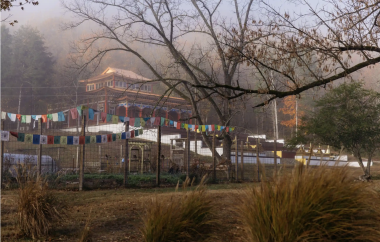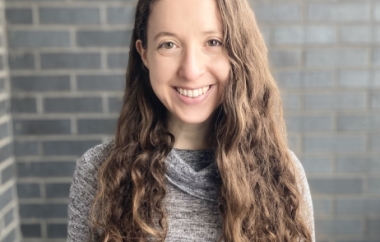Elizabeth Weissberg Publishes Article with The Guardian
Elizabeth Weissberg Publishes Article with The Guardian
Elizabeth Weissberg completed a 6-week writer's residency here at the KHN in the fall of 2022. At the time she was pitching an article and this week the Guardian published it! Congratulations Elizabeth!
They Moved to a Buddhist Retreat in Rural America. Have They Found Happiness?
By Elizabeth Weissberg with photographs by Terra Fondriest
"Nestled in Arkansas, the Buddhist center is remote and summers are sweltering. I spent a week shadowing practitioners to learn whether it changed them in the ways they had hoped"
A short excerpt (for the full article, please follow the link!):
Researchers often compare the impact of different meditative practices to different sports: football players will develop much differently than ballerinas. Studies have linked the first core component – calm abiding meditation – to enhanced attention, decreased stress and improvements in performance. Another potential benefit: in one study, randomly assigned participants who did a three-month retreat that emphasized Tibetan Buddhist calm-abiding practices finished with higher telomerase activity – that is, higher activity of an enzyme that repairs DNA regions associated with aging.
I follow Gonzales as he retrieves his tool belt from a cabin he’s been remodeling for the safety of an elderly practitioner. As we walk up a dirt road, I ask if his practice has any effect on his workday. He says he tries to “maintain the awareness of meditation” in his daily life – a practice referred to by many at the center as “living the dharma”.
“In a workday, there can be a lot of tightness,” says Gonzales. “Pressure. Scheduling. Feeling behind – or just a lot of planning.”
So he engages in contemplative emptiness practice – “emptiness” here meaning the recognition that everything is the result of complex webs of interdependence. We can see an ear of corn on the table and eat it, or we can remember it took farmers, truckers, soil, irrigation, bees – that it’s a collection of kernels, a cob, cellulose, atoms. We can feel a solid and inescapable anger, or we can step back and see its components and the conditions that led to it.
Gonzales says a feeling of spaciousness accompanies meditating on emptiness: “It lifts the tightness.” He says his overall practice has changed him. “I get less nervous, less anxiety,” he says. “I’m better organized. More friendly. Less – I hope anyway – less self-referenced.”
-------
Elizabeth Weissberg's narrative nonfiction investigates questions of meaning and purpose. Her most recent writing explores these themes in the context of grief. She received an MFA from NYU’s Literary Reportage program in 2021, and she holds a BA in philosophy from Yale, where she focused on applied ethics. She has worked as a reported essayist for Weave: The Social Fabric Project at The Aspen Institute and has been published by Thirty West, Soft Punk Magazine, Lens&pens, Teachers College Press, The Life Partners, and Wabi-Sabi Journeys. Elizabeth is a former Yale-China Teaching Fellow and AmeriCorps volunteer.
You can find Elizabeth on Twitter and Instagram at @Eliz_Makes



